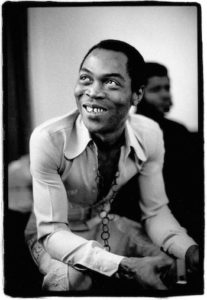
Fela Kuti
*Fela Kuti was born on this date in 1938. He was a Black multi-instrumentalist, bandleader, composer, political activist, and Pan-Africanist.
Olufela Olusegun Oludotun Ransome-Kuti was born into the Ransome-Kuti family, an upper-middle-class family in Abeokuta, Nigeria. His mother, Chief Funmilayo Ransome-Kuti, was a Nigerian women's rights activist. His father, Reverend Israel Oludotun Ransome-Kuti, was an Anglican minister, school principal, and the first president of the Nigeria Union of Teachers. His brothers were both medical doctors. Kuti was a cousin to writer and Nobel laureate Wole Soyinka.
Kuti attended Abeokuta Grammar School. In 1958, he was sent to London to study medicine but decided to study music at the Trinity College of Music, with the trumpet his preferred instrument. In 1960, Kuti married his first wife, Remilekun (Remi) Taylor, with whom he had three children. In 1963, Kuti moved back to the newly independent Federation of Nigeria, re-formed Koola Lobitos, and trained as a radio producer for the Nigerian Broadcasting Corporation. He played for some time with Victor Olaiya and his All-Stars. 1967, Kuti traveled to Ghana, looking for a new musical direction. He called his style Afrobeat, combining highlife, funk, jazz, salsa, calypso, and traditional Yoruba music.
In 1969, Kuti took the band to the United States and spent ten months in Los Angeles. While there, he discovered the Black Power movement through Sandra Smith of the Black Panther Party. This experience heavily influenced his music and political views. He renamed the band Nigeria 70. The band performed a quick recording session in Los Angeles that would later be released as The '69 Los Angeles Sessions. After early experiences abroad, he and his band Africa 70 shot to stardom. During this time, he was an outspoken critic and target of Nigeria's military juntas. In 1984, he critiqued and insulted the authoritarian then-president of the Federal Republic of Nigeria, Muhammadu Buhari. In 1970, he founded the Kalakuta Republic commune, which declared itself independent from military rule.
The commune was destroyed in a 1978 raid. He was jailed by the government of Muhammadu Buhari in 1984 and released after 20 months. He continued to record and perform through the 1980s and 1990s. His popularity throughout the 1970s signaled a change in the relationship between music as an art form and Nigerian socio-political discourse. "Beast of No Nation," one of his most famous songs, refers to Buhari as an "animal in a madman's body"; in Nigerian Pidgin: "No be outside Buhari dey ee / na craze man be dat / animal in craze man skini."
Kuti strongly believed in Africa and always preached peace among its people. He thought the most important way for them to fight European cultural imperialism was to support traditional religions and lifestyles in their continent. He supported Pan-Africanism and socialism and called for a united, democratic African republic. Kuti was a candid supporter of human rights, and many of his songs are direct attacks against dictatorships, specifically the militaristic governments of Nigeria in the 1970s and 1980s. He also criticized fellow Africans (especially the upper class) for betraying traditional African culture. Kuti's album output slowed in the 1990s, and eventually, he ceased releasing albums.
In January 1993, he and four members of Africa 70 were arrested for the murder of an electrician. Rumors also speculated that he was suffering from an illness for which he refused treatment. However, Kuti has not confirmed this. On August 3, 1997, Kuti's brother Olikoye Ransome-Kuti, already a prominent AIDS activist and former Minister of Health, announced that Kuti had died the previous day from complications related to AIDS. His widow maintained that he did not die of AIDS.
Since his death, his son, Femi Kuti, has overseen reissues and compilations of his music. As of 2020, the band is still active, releasing music under the moniker of his youngest son Seun's band, Egypt 80.